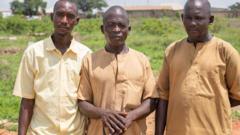For more than half a century, the Abdullahi family in Kaduna, Nigeria, has devoted themselves to caring for the city's largest cemetery, Tudun Wada, a service greatly appreciated by the local community. Until recently, they had performed this demanding role without formal compensation—digging graves, washing corpses, and managing the cemetery mostly on donations received from mourners. The cemetery was designated a century ago for the city’s Muslim residents.
Ibrahim and Adamu Abdullahi began this journey in the 1970s. Now, their children uphold the tradition, following the principles instilled in them. Magaji Abdullahi, the eldest son of Ibrahim, currently oversees operations at the cemetery, working alongside his two cousins, Abdullahi and Aliyu. Together, they have transformed their family legacy into a crucial community service.
Their daily routine begins at dawn, as they receive calls from mourners or religious leaders requiring graves to be dug quickly for burials in accordance with Muslim customs. Grave digging can take an hour, or even longer depending on ground conditions, and the team has the ability to dig up to a dozen graves in a single day. They face extreme heat while striving to provide timely services that are essential to grieving families.
In addition to the physical labor, the Abdullahi family has endured the emotional toll of working during periods of religious conflict in Kaduna, which has sometimes led to chaotic situations where they had to recover bodies from the streets. Despite such challenges, the family remains steadfast and committed to their responsibility, reinforced by a sense of divine service, as articulated by Magaji.
With funeral rites commonly performed on the same day as a death, mourners are drawn to the cemetery after prayers at the local mosque. As the body is interred, the grave is marked with essential yet simple markers due to Islamic customs discouraging opulence.
Although the only financial support the team received was through donations, they managed to sustain their mission while also tending to a small farm. Nevertheless, the outdated equipment and poor security at the cemetery still pose challenges.
A recent visit from the local council chair brought a significant change: the Abdullahi family is now on payroll for their monumental work—a timely acknowledgment of their service that had long gone unrecognized. While their pay is below the national minimum wage, there are promises of improvements in their working conditions and compensation in the future. The council chairman expresses a commitment to enhance the cemetery's infrastructure, aiming to ensure the safety and continuity of the valuable service provided by the Abdullahi family.
For them, the prospect of a new generation assuming this important role at Tudun Wada Cemetery is a dream nurtured by their dedication and community spirit.





















